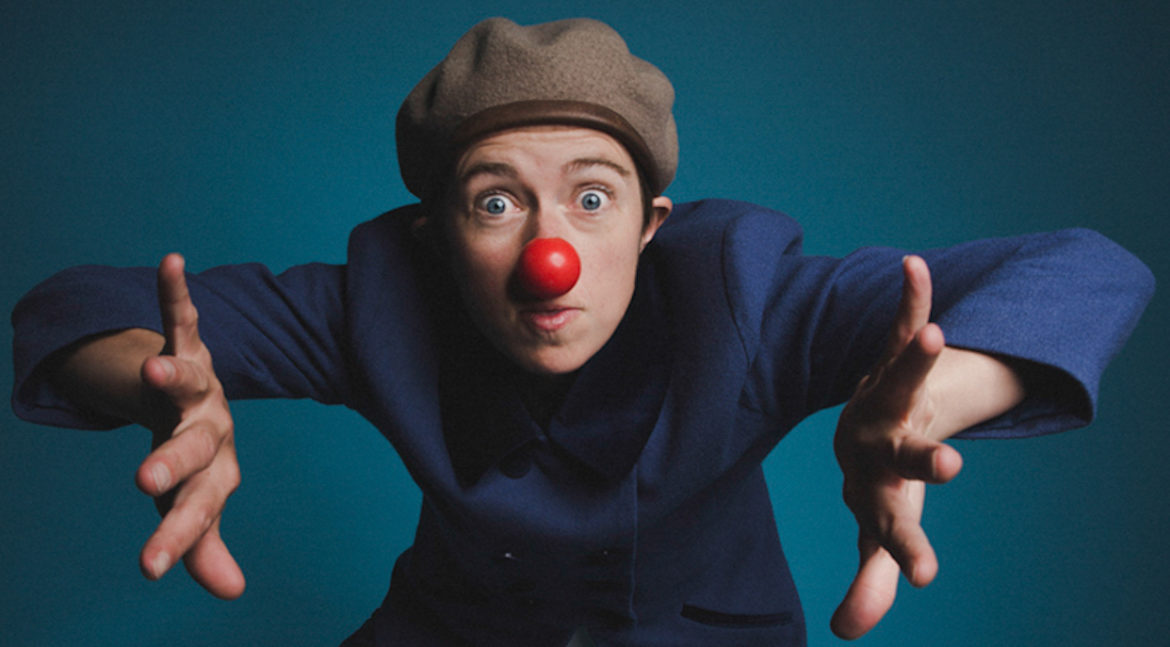The evocation of the child within animates the charm of La Mama’s Jofus and the Whale, writes youth critic Gully Thompson
It may be unnecessary to say, but I haven’t been to the theatre for a very long time. And while I’ve experienced many forms of substitutes for theatre over lockdown, I can’t say I’ve experienced the same joy and emotional pull that comes with a live performance, one that moves and skips with its audience and brings theatrical intimacy to the art.
Jofus and the Whale – on at La Mama until February 21 – is the reintroduction to live performance Melbourne needs and deserves. It highlights the art of performance, storytelling and the experience of theatre.
Jofus is a clown, a comic, innocent and childish clown clown who performs alone and yet never seems alone. Performed and created by Lily Fish, who plays all the characters, and directed by Kimberly Twiner, the show is a comic retelling of Herman Melville’s Moby-Dick. It features the character of Jofus and their great uncle Ahab, who is on a quest to take vengeance upon the whale who took his leg. The show begins as Jofus anxiously inches towards the spotlight, takes their place and excitedly exclaims:“Theatre!”
And this is truly what the show represents at its heart. After a long winter of on-screen performance and a lack of human-to-human theatrical intimacy, Jofus embodies a love and appreciation not only of the performing arts but of storytelling and the language of comedy. Jofus is narrated through the conventions of innocence and naivety with a voice which reminds me strongly of children recounting and telling stories to one another.
‘Fish has crafted a tribute to circus humour and clown performance that demonstrates both an understanding of the breadth of the art and a tribute to its many forms.’
Fish’s performance takes the conventions of clowning and transforms them into a performance style that is uniquely her own. A fresh and innovative blend of charades, shadow-puppet style hand gestures, vocal work and mime – all elements of different comedic genres and styles – are seamlessly combined to create a performance that is unmistakably original.
The comedy of the piece is unapologetically and proudly childish, including a fine myriad of poo and fart humour. Fish has crafted a tribute to circus humour and clown performance that demonstrates both an understanding of the breadth of the art and a tribute to its many forms. The style of the humour also reinforces the voice of the show, the return to childhood storytelling and performance that is both silly and sophisticated.
As a solo performance, Jofus and the Whale is a reflection on loneliness which becomes extremely relevant in the wake of lockdown. It is both a meditation on and celebration of what is keeping Victorians strong through an age of isolation.
Despite the absence of other performers, set pieces and effects, Jofus is never quite alone. The performance and character of Jofus, in the true nature of clowning, skips over the boundary between performer and audience with ease and bring a sense of intimacy and companionship. Jofus is not so much a clown as a storyteller, and we are not their audience, but their friends.
Fish’s performance is characterised by a great deal of vocal effort. Jofus’s voice is high-pitched, excitable, breathy, and in some cases quite difficult to understand. Its execution resulted in moments when the context and plot of the show were difficult to decipher because I sometimes could not understand a spoken line.
Which leads to the major problem with Jofus’s character; their excitement and childish nature sometimes leads to a charade or a mime that is hard to understand within the plot of the show. The narrative is fairly simple, being an abridged Moby-Dick, but sometimes I felt a line or movement was lost in translation.
Jofus may cause an occasional moment of confusion, but that is created by their excitement – their recounting of their misadventures and the odyssey they embark on as they make their escape from the whale energises them and us as their audience and companions. As a character, not once does Jofus flinch at the opportunity to entertain, to delight and to boast. And most importantly, we are with them every step of the way.
Jofus and the Whale is a thrilling engagement with the nature of loneliness and the odyssey of one’s own character. The strength of performance here is exemplified by how theatrical intimacy can be derived from a character who is fundamentally a clown and a child. It reminds us of the importance of the inner child and the world of innocence. It’s essentially a comedy, but perhaps it is more a comedy of the self, a demonstration of the need for performance and the pursuit of playfulness.
Jofus knows they are a clown and knows they are immature, and they are never ashamed of this. They show us that companionship always contains an element of loneliness and the necessity to reflect on the self. Conversely, they show that in every instance of loneliness, there is companionship. And that, simply by being, we are their companions.
“Theatre!”
Jofus and the Whale, created and performed by Lily Fish, co-written and co-devised by Ell Sachs, directed by Kimberley Twiner, lighting design by Lisa Mibus. At La Mama Courthouse. Until February 21.

